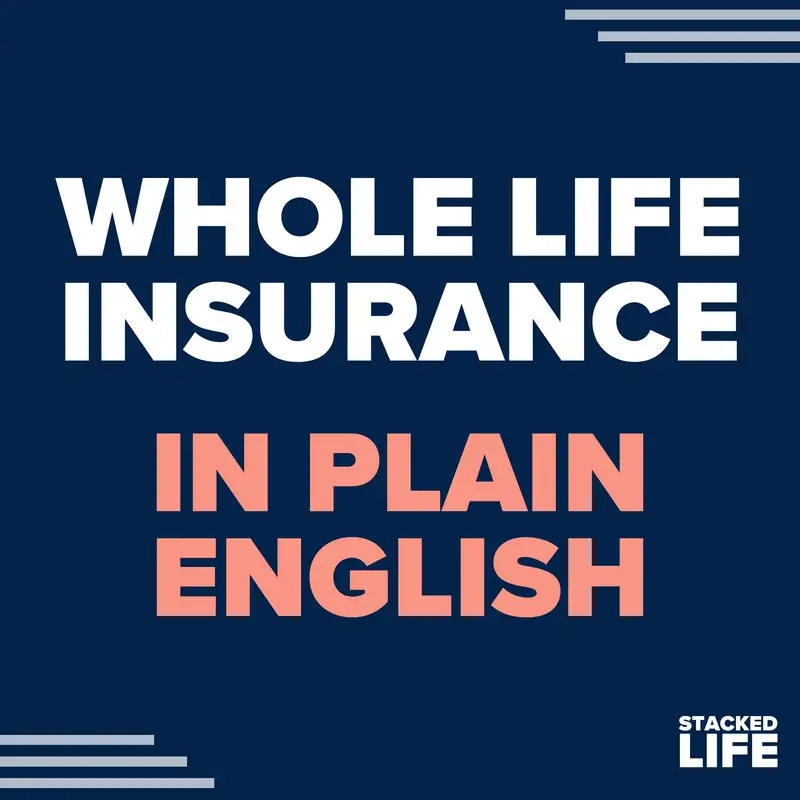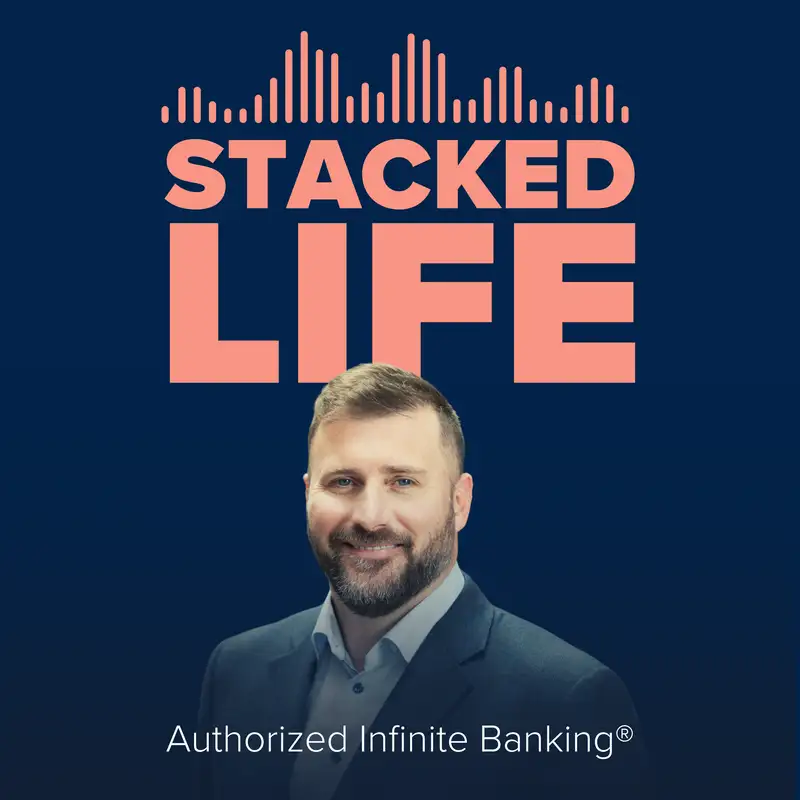02: What Is Whole Life Insurance (in Plain English)?
002 What is Whole Life Insurance in Plain English?
===
[00:00:00] There are a lot of strong opinions out there about whole life insurance, to put it mildly. But what if I told you most people's opinion of whole life insurance comes from someone else's opinion, not from understanding what it actually is? Well, today we're going to cut through some of that noise and explain whole life insurance in plain English so you can make an informed decision for yourself.
This is Stacked Life, the podcast that teaches you everything you need to know about Infinite Banking, whole life insurance, and the strategies that make it all work. And I'm John Perrings, an Authorized Infinite Banking Practitioner. I've implemented IBC for hundreds of my clients and educated thousands more with original content from my podcasts, articles, and courses over at StackedLife.com. By the end of this episode, you'll You'll understand exactly what whole life insurance is, how it works, and why it might be one of the most misunderstood and underutilized financial tools available today. So, here's what we'll cover:
We'll help you [00:01:00] understand whole life insurance as an asset class.
I'll share my real estate analogy for term versus whole life insurance.
How cash value works and grows,
We'll talk about policy loans and accessing the money or your cash value from the policy.
And the additional benefits beyond just IBC.
To get started, let me tell you about a conversation I seem to have over and over again, and it happened again this past week.
I was talking to a guy who has been doing really everything right according to the conventional wisdom around money. You know, for years he's been diligently maxing out his 401k, funding 529s, budgeting, paying down his mortgage. He does all of this, but when he needs money for something, he never seems to have any.
He looks at his statements and on paper he's got all this money, but it feels like it's sort of locked away in a glass case. He can see it, but he can't really get to [00:02:00] it. So people ask me all the time, why would I choose Whole Life Insurance over Term Insurance? They, They look at whole life and they believe that it's, you know, too expensive.
They buy term with the idea of investing the difference. And if they actually do invest the difference, they end up doing what I just mentioned and kind of locking the rest of their money away for decades where it's out of their control. They don't realize that life insurance can be an asset that gives them liquidity, control, and certainty. So, a A simple question to ask yourself is if you're in the market to buy life insurance, do you want it to be an expense, aka a liability, or do you want it to be an asset? Keep that question in mind as we go through the rest of this episode.
So, let's look at whole life insurance as an asset class. Just like stocks, bonds, real estate, or treasuries, it's simply another type of [00:03:00] asset that may or may not have a place in your financial picture. Whole life insurance is an actuarial product, which uses the law of large numbers to calculate risk, which sort of lets it look into the future a little bit and know with a high level of certainty some of the things that are going to happen with the risk they assume.
Life insurance companies are incredibly accurate with knowing how many people will die every year, how many of their policy holders, but they don't know which ones of course, but they do know how many And this gives Whole Life some unique characteristics that you simply can't find anywhere else.
The uniqueness of Whole Life Insurance, it's kind of like a mixture of properties that are similar to other assets. I always tell people Whole Life is kind of like a savings account, a corporate bond, a Roth IRA and a piece of real estate got together and had a baby. It has the guarantees and liquidity of a savings account.
It has [00:04:00] growth similar to and a lot of times better than a corporate bond. It has tax treatment like a Roth IRA where after tax money goes in and grows tax deferred , but you can get to it tax free. And believe it or not, the access to credit with whole life insurance is actually very similar to real estate.
We'll talk a little bit more about that. Speaking of real estate, let's use that to understand the difference between term and whole life insurance. Term insurance is kind of like renting an apartment. You pay your rent for as long as you want to live there and when you move out, you don't get any of that rent money back.
Similarly, with term insurance, you pay premiums for a specific term, typically 10, 20, 30 years, and if you don't die during that term, the policy ends, it wraps up, and you don't get anything back. You don't get any of those premium dollars back.
And this is an important thing to understand. The premiums are much lower because the risk of the [00:05:00] insurance company is much lower. People buy term insurance during a period of life when it's statistically highly unlikely that they'll die. Then the policy goes away and they're now uninsured during the period where it's actually guaranteed they will die.
And so, It's something to keep in mind where if we compare that to whole life insurance on the other hand, it's more like buying a house. Every time you make a mortgage payment, you build equity in the house. Similarly, every premium payment builds equity in the policy. With a house, you build equity in real estate.
With whole life, you're building equity in the death benefit. That equity is called cash value or cash surrender value. Cash surrender value is the money you're guaranteed to get back if you ever decided to surrender the policy. It's called whole life because it lasts your whole life.
And the reason it builds cash value is because whole [00:06:00] life insurance is guaranteed to pay a death benefit no matter when you die. Unlike term insurance, which only pays a death benefit if you die within the term. In finance terms, whole life insurance has a guaranteed future value in the form of a cash flow from the death benefit.
And this means there's a present value to that cash flow and that's what the cash value is. This is why simply comparing the premium prices between term and whole life insurance is really inappropriate because you get two very different outcomes out of this. One you're just renting, the other one you're actually buying.
So, Now let's talk about the cash value in your policy and how it actually grows. There are two key components to this growth. First, you have an actuarially guaranteed growth every single year. This means the cash value is guaranteed to increase with no down years ever. And then there's a dividend [00:07:00] component, and while these dividends are not guaranteed, it's really kind of the only non guaranteed component of a whole life policy.
The mutual companies we work with have been paying them consistently for over 100 years. You know, some of them are in the 175 year area. So those are the two components. You have the guaranteed and the non guaranteed dividend. And this brings up an important point about the type of company you want to work with.
For Infinite Banking, we always recommend dividend paying whole life insurance policies with a mutual insurance company. We recommend mutuals because when you're a policy owner with a mutual company, you're actually a part owner of the company itself, which means all of the profits go back to the policy owners like what we talked about in the form of an annual dividend that I mentioned. Now, one of the most powerful features of whole life insurance is the access to credit through policy loans. So remember, going back to the real estate analogy, [00:08:00] just like you can get a home equity loan.
HELOC against your house, you can take out policy loans against your cash value. These policy loans have several advantages over HELOCs, but they're really pretty similar other than these advantages I'm over. So the first thing, there's no underwriting. You don't have to qualify. You don't have to apply to get approved.
It's guaranteed access to credit. No questions asked. The second piece is there are no required payback terms. You can pay a policy loan back whenever you want, including the interest. Whereas with a HELOC, of course, you're subject to their payback terms. You could technically never pay back a policy loan at all.
It's not That's what we recommend in the early stages of Infinite Banking, but it absolutely could have a place, um, for a retirement strategy where you take policy loans to get tax free income with the plan of never paying those back. What they do is they just net that [00:09:00] out of your death benefit when you die.
So The cash value is your collateral. It's guaranteed only to grow. And so this brings us to our third differentiation between a HELOC. The underlying collateral of a policy loan is guaranteed only to grow, never to go down. Unlike real estate values, which can fluctuate, your policy's cash value keeps growing when you have loans outstanding.
And so this is a really huge benefit because You know, if you have a HELOC, an outstanding HELOC, and the value of the property goes down in a real estate crash like we saw in 2008 and 2000 before that, , that can get you in a real bind because those banks can start calling those loans or lines of credit, , because the value's not there to support the line of credit anymore.
So, you know, it's interesting people who call whole life insurance a horrible investment, which is pretty common. , here's the thing: whole life [00:10:00] insurance isn't an investment at all. It was never meant to be one as an asset class. Whole life insurance is considered a cash equivalent, right? Not an investment.
It's an excellent place to store and grow cash. One of the areas where people get. A little bit hung up with whole life insurance is during the first few years. So I just want to talk about during these early years, you, you do have less cash value than what you've paid in premium. So it's not like a savings account.
You're buying insurance. So the present value of that future death benefit has to catch up a little bit before it becomes cash flow positive.
So there are a few years where you, you don't have as much cash value as what you've paid in premium. And the reason for that is because the majority of the Upfront costs of a whole life insurance policy are typically recouped by the insurance company during these early years. And if you think about it, it makes sense.[00:11:00]
You know, the insurance company, , when the insured of the policy pays their first thousand dollars in premium, for example, the insurance company is on the hook for like a million bucks. So You know, they want to recoup these costs and, you know, it depends on the carrier and the product and everything.
But , some of these, carriers, these insurance carriers, it takes like 10 years for them to break even on these policies. So they need to at least get to a point where they can, uh, recover their costs of acquisition. But once you get past these costs, the policy becomes more and more efficient every single year.
And so you can think of it almost like starting a business. So, we're talking about The Infinite Banking Concept and, you know, if you're starting your own banking system, it's like you're starting a business. There are startup costs in the early years. But once you get past those first few years, every premium dollar starts creating more than one dollar of cash value.
So that's when it becomes. [00:12:00] What I like to call a liquidity rocket ship, you know, where every dollar you pay starts to create $1.10, $1.50, $2, $3, $4 as the policy gets more and more mature. And again, I want to point out, contrary to some people's opinions, whole life insurance has an incredible rate of return for the type of asset it is.
For a cash equivalent asset, if you run a capital equivalent analysis, taking into account taxes, fees, and commissions, and term insurance that you'd need if you're going to buy, term invest the difference. If you take all that into an account, you'd need to get like a 7 or 8 percent return in another type of asset to match everything that you get, _net, _with whole life insurance.
So usually when people say whole life insurance is a horrible investment or gets a bad rate of return, they're really not making an apples to apples comparison, which I have done that. And you can get that information on my website at StackedLife. com. I'll make mention [00:13:00] of that at the end of this episode.
And you know, I'm saying seven or 8 percent and of course we have to take that with the caveat, everything depends on your age and health with life insurance and whether or not you can qualify. Um, just kind of closing this thought out, It's not an investment, but it's also not a slouch compared to an actual investment either.
So the other, the other factor we want to think about when we start thinking of like returns and all that stuff, tying back a little bit to episode one about Infinite Banking, It's not necessarily about the returns on the whole life policy itself, but often it's more about the returns outside the policy that you can get by leveraging the cash value.
And so sometimes we call whole life insurance the "AND" asset, A N D asset, because you can buy whole life insurance And you can use the cash value to buy something else. So the idea that [00:14:00] we have to compare this or that, it's actually incorrect. Most critics of whole life miss this point entirely, and they think it's an either or decision.
Like, why would you buy life insurance when you could buy stocks? That's not the right comparison. You can have both using your policy's cash value through policy loans to finance other purchases or investments. But here's what's really incredible. Infinite Banking isn't even the only benefit you get with a whole life policy.
Let me share some other powerful features that you can get while you're performing the infinite banking concept with whole life insurance.
Number one, it can improve your retirement outcomes through what's called a volatility buffer strategy. Since your cash value never goes down while you're in the retirement years and withdrawing money, you can actually use it For income when your market investments are down, allowing those market investments to recover.
You can get disability protection through a waiver of premium rider. If you become [00:15:00] disabled, the insurance company continues paying your premiums, keeping your policy growing.
Number three, most policies come with chronic and terminal illness riders at no additional cost. And these riders give you access to the death benefit amount, which is going to be always be larger than your cash value until the very last year of the policy.
So if you become seriously ill or terminally ill, this can help prevent you from becoming a burden to your family. The beauty in this is that you get all these benefits simultaneously. Every premium dollar is doing multiple jobs at once. Your policy is growing cash value. It's providing a death benefit. It offers disability protection, chronic and terminal illness protection, creating tax advantages and giving you guaranteed access to capital all at the same time.
And so it's like, I don't know, are the haters crazy? Because what's not to like about that? It's a, it really blows my mind sometimes. Whole life insurance isn't [00:16:00] perfect. It's, you know, no financial tool is, but when structured correctly and especially when the Infinite Banking Concept piece is added in, It really is one of the most powerful and versatile financial tools available today.
So as we wrap this up, you know, if you want to learn more about how to put these concepts into action in your own life, if some of the, if some of these concepts are resonating with you, I've created a free mini course called Adding Financial Certainty to Supercharge Growth, and you can get instant access to that over at my website, StackedLife.com/supercharge. And if you wouldn't mind doing me a favor as I relaunch all the valuable information I have with this new podcast, if you could leave me a five star review in your favorite podcast app, that sure would help me out a lot. Much appreciated. By the way, check out episode three next where I answer the question, is IBC legit?
We'll have some fun and I'll crush a lot of myths and misconceptions about IBC and whole life [00:17:00] insurance. See you over there.
Creators and Guests


